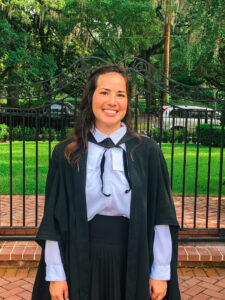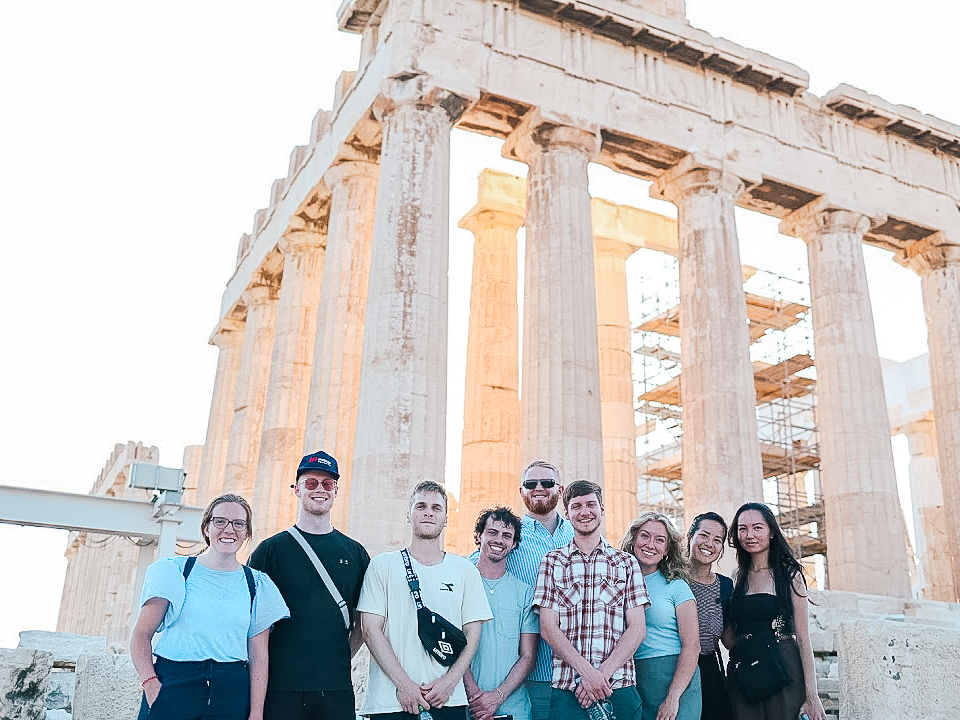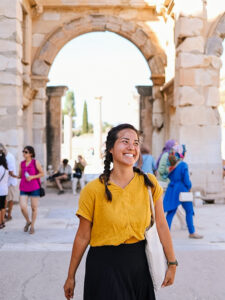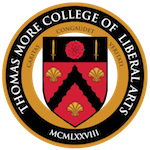By Cassandra Taylor, Publications Assistant
 On May 20, 2024, two days after Thomas More College hosted its own Commencement ceremony, Ralston College (Savannah, GA and Samos, Greece) graduated its second class of alumni. Among the twenty-three to earn a Master of Arts in the Humanities from Ralston that day—after an exclusive one-year intensive program that included an eight-week, full-immersion ancient and modern Greek residency—was Danielle Summers ’23.
On May 20, 2024, two days after Thomas More College hosted its own Commencement ceremony, Ralston College (Savannah, GA and Samos, Greece) graduated its second class of alumni. Among the twenty-three to earn a Master of Arts in the Humanities from Ralston that day—after an exclusive one-year intensive program that included an eight-week, full-immersion ancient and modern Greek residency—was Danielle Summers ’23.
Miss Summers took time to tell us about her experience at this new and exciting institution, how her education at TMC prepared her for an intensive MA program, and what she would have done differently during her Rome semester.
Tell us all about your time at Ralston College!
Ralston College was an incredible experience. I always joked to my friends that after the workload at TMC, graduate school could not possibly be that difficult. Ralston proved me wrong, but in the best way. My professors called Ralston College a boot camp in Western Civilization, for we only had ten short months to work our way through the canon of Great Books that we spent four years reading at TMC. Beginning our course of study in Greece was both inspiring and humbling. Studying on the shores of the Aegean is incredible, but having to focus to understand each word of a language in an unfamiliar alphabet is a humbling experience.
Ralston focuses on Beauty, Truth, Freedom, and Fellowship, and they provided the opportunity for each of us to internalize these virtues from day one. Our professors love the subjects that they teach and that comes across in the classroom every day. One of the things that stuck with me from our first dinner at the foot of the Acropolis was that we would be partaking in a tradition. We would be learning from our academic fathers stretching all the way back to Homer. This became especially real for me as I learned that my primary Ancient Greek instructor taught my Greek professor at TMC. This was only one of the many ways that TMC prepared me for the rigors of graduate school and especially Ralston College.

How did your immersion semester in Greece compare to your time in Rome? What did these experiences teach you about the world and about yourself?
When I first arrived in Greece, my overseas instinct kicked in and I immediately started talking to the locals in my limited Italian, which was a funny experience. The Greece term was much more intensive than our semester in Rome because it is entirely focused on language acquisition through full immersion. It made me wish that while in Rome there had been more of an effort among the students to learn Italian. It is an invaluable experience for language acquisition to be immersed in the country and culture, and I wish that I had made more of an effort to learn Italian while I had the opportunity.
 I think the biggest difference between the terms in Rome and Greece was the cultural spirituality. As a Roman Catholic, going to Rome was akin to going home to my cultural and spiritual roots, but going to Greece was entirely different because the country is largely Orthodox. I appreciated being able to see the differences and learn more about a different culture that split off from the same beginnings as the Roman church. It was very eye-opening and made me appreciate different aspects of my faith that seemed to be more ancient in a way. We visited the island of Patmos where St. John the Evangelist was exiled and attended an Orthodox service in the cave where he wrote the Book of Revelation. It was an incredible experience to be able to attend a service in the language we were studying and recognize that St. John would have known these people and shared in their culture. Overall, I was able to appreciate the continuity of the Greek language in the faith of the Orthodox and recognize the beauty of the language in the texts that we were reading in class.
I think the biggest difference between the terms in Rome and Greece was the cultural spirituality. As a Roman Catholic, going to Rome was akin to going home to my cultural and spiritual roots, but going to Greece was entirely different because the country is largely Orthodox. I appreciated being able to see the differences and learn more about a different culture that split off from the same beginnings as the Roman church. It was very eye-opening and made me appreciate different aspects of my faith that seemed to be more ancient in a way. We visited the island of Patmos where St. John the Evangelist was exiled and attended an Orthodox service in the cave where he wrote the Book of Revelation. It was an incredible experience to be able to attend a service in the language we were studying and recognize that St. John would have known these people and shared in their culture. Overall, I was able to appreciate the continuity of the Greek language in the faith of the Orthodox and recognize the beauty of the language in the texts that we were reading in class.
How do you feel your time at Thomas More College prepared you for graduate school, and particularly for the accelerated MA program?
Many of my classmates asked me whether it was helpful to have already studied the texts that we read during our time at Ralston. I think it was immensely helpful to have had an introduction to the ancient and medieval texts before reading them in the original Greek, or even just reading them in translation again. Besides the academics, the transition to another Humanities course was seamless because the rigorous courses were very similar. I did not take the high standard for academic performance at TMC lightly, which was the best preparation for a graduate program as intense as Ralston’s.
Would you like to share a favorite TMC and/or Ralston memory?
My favorite moments at TMC and Ralston are also related. The banquets that were moments of celebration, feasting, and good conversation at TMC were also an integral part of community life at Ralston. Nothing supports laughter and good conversation like being around the banquet table. I think that this is the best way to foster friendship in community, and I am incredibly grateful for all the moments in which I was able to share meals with my classmates and professors.
 What were your favorite classes at TMC and Ralston? Do you see any connections between the two?
What were your favorite classes at TMC and Ralston? Do you see any connections between the two?
My favorite classes at TMC were all of the Aristotle courses, but especially Physics and De Anima. There was a direct connection between these classes and the Greek classes we took at Ralston. The emphasis on the Greek in my Physics class inspired me to learn Greek so that I could read Aristotle in the original. We did read many of the same texts at Ralston as we read at TMC, but this was far from redundant. The Iliad, Augustine, Boethius, and Shakespeare are all works that ideally should be read again and again. Ralston gave me the opportunity to reread these works with context that I had received from TMC, but with the fresh eyes of new instructors and classmates.
Is there anything else you would like to share?
I would like to encourage any TMC students who would like to apply for the program to do so! It is an excellent program concerning continuity, and if you have ever wanted to learn Greek, I believe this is the best way to do so in the least amount of time.
For further reading:
Bringing the Flame of Faith to the World:The Class of 2023 Graduates
Finding Success after Graduation: An Interview with Dr. John Martin ’11
